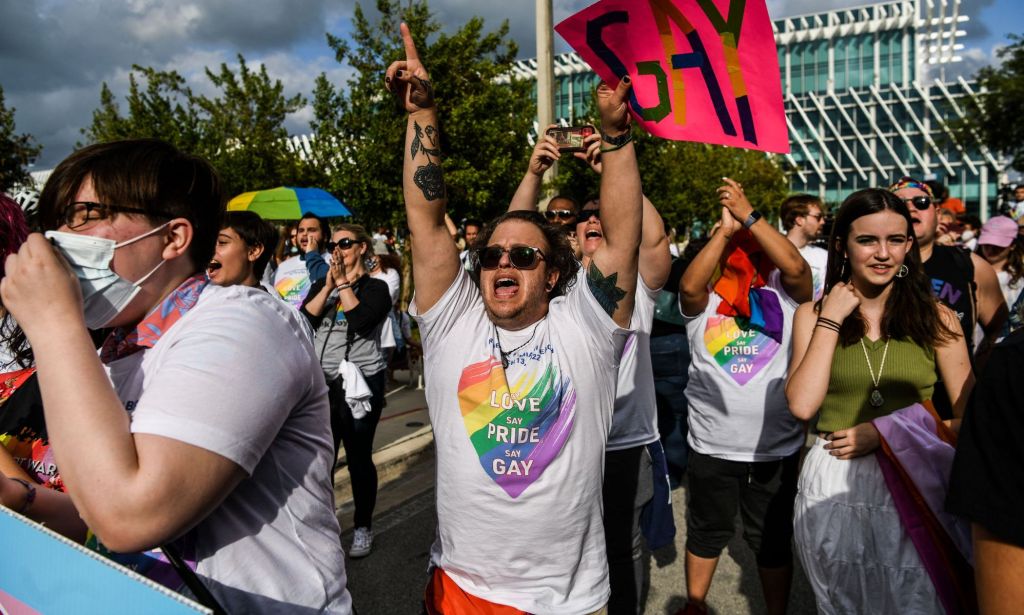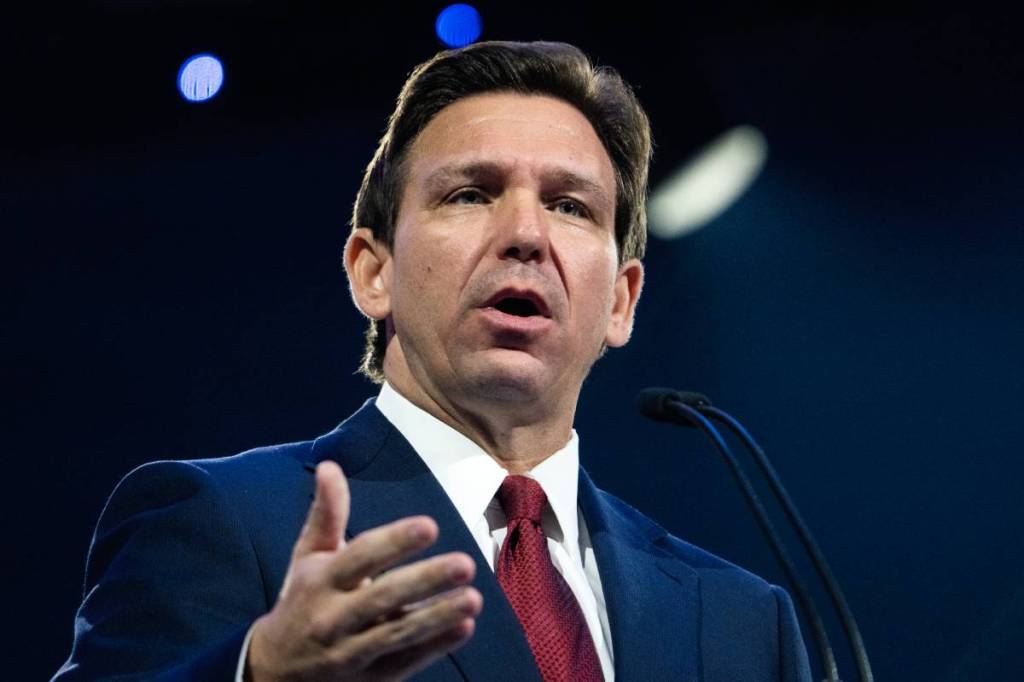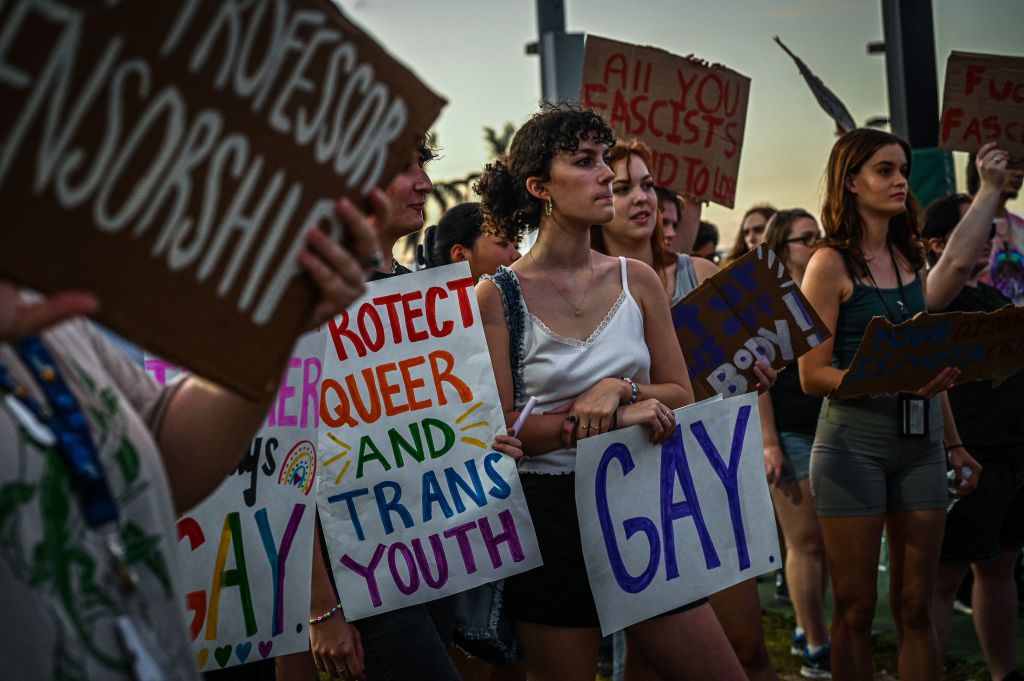US presidential hopeful Ron DeSantis’ anti-LGBTQ+ attacks: A timeline of hate

Florida’s Republican governor Ron DeSantis is expected to announce a presidential bid. (Getty/ Octavio Jones)
In news that will not surprise, but will still horrify, LGBTQ+ people and allies across the US and the world, Florida governor Ron DeSantis has confirmed his intention to run to become the 47th president of the United States.
Republican DeSantis, who has used his time as Florida’s governor since 2019 to launch a series of sweeping attacks on the rights of LGBTQ+ people, as well as those of women and ethnic minorities, announced the news in a Twitter Spaces conversation with the social media site’s chief executive, Elon Musk, on Wednesday (24 May).
The widely-expected announcement pits DeSantis against another Florida resident and Republican, former president Donald Trump, who confirmed his bid for a second term in the White House in November.
Republican voters will determine which candidate is selected as the party’s nominee to run against incumbent president Joe Biden in the November 2024 presidential election during a series or state-level elections – known as primaries – that begin in February.
The winner will be formally confirmed at the Republican Convention, in Milwaukee, Wisconsin, in the summer of 2024.

Having turned the Sunshine state into the frontline of US culture wars, the prospect of a DeSantis victory is not an attractive prospect for LGBTQ+ Americans – not that Trump offers a better alternative.
Speaking to PinkNews in March, Scott Galvin, the executive director at Safe Schools South Florida, warned: “What would happen with Ron DeSantis as president is that the federal government would start supporting those local laws and implementing them on a national scale.”
Ron DeSantis has played a key role in anti-LGBTQ+ legislation including Florida’s Don’t Say Gay bill
Most attention has been focused on DeSantis’ role in passing a much-criticised law that restricts the discussion of LGBTQ+ topics in schools.
Widely dubbed Don’t Say Gay, the Section 28-style legislation was signed into law in March 2022, prompting outcry from local LGBTQ+ organisations as well as celebrities, including Ariana Grande and George Takei.
As the bill went into effect on 1 July last year, reports flooded in of teachers being told not to wear rainbow-coloured clothes, to avoid mentioning their same-gender spouses and to remove safe-space stickers from classes.

A year earlier, DeSantis signed the Fairness in Women’s Sports Act into law, banning trans girls and women from competing in sports competitions that correspondent with their gender identity in middle school, high school and at college.
In April 2022, he signed the Stop Woke Act, which heavily restricts how workplaces, schools and colleges teach about racism, homophobia and other systemic biases, by banning anyone from discussing how people can be “inherently racist, sexist or oppressive”.
By April of this year, LGBTQ+ advocacy group, Equality Florida, had taken the “unprecedented step” of issuing a travel advisory for LGBTQ+ people visiting the south-eastern state.
That move was echoed earlier this month by the National Association for the Advancement of Colored People, following restrictions on African American studies courses and teaching around race issues.
Attacks on LGBTQ+ rights have increased ahead of DeSantis’ presidential bid
Ron DeSantis’ legislative attacks on LGBTQ+ people increased significantly in the days and weeks leading up to the announcement of his presidential bid, with a flurry of bills being signed into law in the past few weeks.
One piece of legislation, known as the Protections of Medical Conscience, would allow doctors and insurers to cite religious or moral beliefs to deny LGBTQ+ people non-life-threatening care.
Another is a law that bans Florida colleges from spending funds on diversity, equity and inclusion (DEI) programmes, with DeSantis perversely claiming that “DEI represents discrimination, exclusion and indoctrination”.
Also this month, DeSantis expanded Don’t Say Gay, having proposed the change in March, to “forbid classroom instruction on sexual orientation and gender identity in all grades”.
On the same day, DeSantis enacted a string of other anti-LGBTQ+ legislation, as part of what Florida’s government has termed the Let Kids Be Kids package.

House Bill 1521, set to restrict trans people’s access to public toilets, domestic violence shelters or prisons that correspond with their gender identity, is due to become law on 1 July.
Gender-affirming care for trans youth was banned by bill Senate Bill 254, which also grants authorities the right to remove children from the care of their parents if they are if they are “subjected to” or “threatened with” such care.
Senate Bill 1438, meanwhile, imposes penalties on venues that allow “adult” performances to take place in front of children. Featuring vaguely defined language about “lewd conduct”, it has been criticised as an attempt to restrict drag performances and Pride events.
Then there’s House Bill 1069, which prohibits the requirement of students and staff to refer to trans people by their correct pronouns, while also tightening the regulation of library or classroom resources deemed to contain references to “sexual conduct”.
DeSantis said of the most recent spate of bills: “Florida is proud to lead the way in standing up for our children. As the world goes mad, Florida represents a refuge of sanity and a citadel of normalcy.”
DeSantis has also attacked women’s rights with draconian abortion legislation
But Ron DeSantis hasn’t only been taking aim at the LGBTQ+ community.
In April, the governor signed a law banning abortion in Florida after just six weeks of pregnancy.
The Heartbeat Protection Act will only come into effect if Florida’s current 15-week ban – currently being challenged before the state’s Supreme Court – is upheld.

The six-week ban does not apply in cases where a woman’s life is at immediate risk, while the 15-week limit would remain for pregnancies involving rape or incest, but only where a woman has legal documentation such as a police report, the Associated Press stated.
Responding to the passing of the bill, White House press secretary, Karine Jean-Pierre, highlighted that “this ban would prevent four million Florida women of reproductive age from accessing abortion care after six weeks – before many women even know they’re pregnant”.
The bill also came as a blow to millions of other women living in nearby US states where stringent abortion bans and limits have been introduced following the overturning of the landmark court case Roe vs Wade last year. Previously they could travel to Florida to access reproductive care.
Who will win the Republican presidential nomination: Ron DeSantis or Donald Trump?
Despite DeSantis’ conservative, nationalist policy agenda and anti-LGBTQ+ rhetoric, the Florida governor is still lagging far behind Trump in the polls.
A recent Reuters/Ipsos survey showed Trump was backed by 49 per cent of Republicans compared with just 19 per cent for DeSantis.
Regardless of the campaign’s eventual outcome, DeSantis’ impact on US political discourse and the lives of minority communities cannot be overstated.
Brandon Wolf, the press secretary at Equality Florida, told PinkNews in March that the governor has been instrumental in stirring up anti-LGBTQ+ hate that reaches far beyond his state’s own borders.
“His agenda of slandering the LGBTQ+ community and falsely painting us as an existential threat to society has fomented the kind of bigotry now exploding across the country”, Wolf said.

